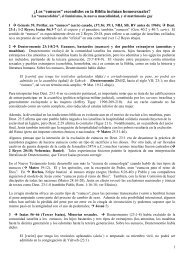Deuteronomy: - Fundación Otras Ovejas de Argentina
Deuteronomy: - Fundación Otras Ovejas de Argentina
Deuteronomy: - Fundación Otras Ovejas de Argentina
Create successful ePaper yourself
Turn your PDF publications into a flip-book with our unique Google optimized e-Paper software.
3 Seducer of virgens:<br />
o Engaged, *Deut. 22:23-27;<br />
o Not engaged, Deut. 22:28-29; � Ex. 22:16-17;<br />
4 Incest; � Leviticus 18 and 20:<br />
o With the wife of the father, 22:30; � 27:20 (see Gen. 9:21-29 + patriarchs);<br />
o With sister or mother-in-law, 27:22-23; � Lev. 18:9,8;<br />
5 Man who practices bestiality, 27:21 (� Ex. 22:18; + women in Lev. 18:23, 20:15-16).<br />
Especially notable, however, are the legal provisions concerning the seven themes that do not occur in the other<br />
co<strong>de</strong>s, but only in <strong>Deuteronomy</strong> (see below):<br />
*6 Transvestites (Deut. 22:5);<br />
*7 Remarriage prohibited with the same woman after the divorce, 24:1-4;<br />
*8 Levirate marriage (with widow of the <strong>de</strong>ceased brother), Deut. 25:5-10<br />
(cf. Genesis 38; Ruth);<br />
*9-11 Eunuchs, bastards (mamzer) and two ethnic groups (gentiles), 23:1-8;<br />
*12 Prostitutes (cultic?): ―Sodomites?‖, 23:17-18; � 1-2 Kings.<br />
3.1 Four Laws in the Pentateuch imply approval of polygamy:<br />
� Deut. 21:15-17. Take the case of a man with two wives, one of whom he loves but not the other; both give<br />
him children, and the first-born is the child of the unloved wife. When this man distributes his inheritance among<br />
his children, he will not give the right of the first-born to the son of the loved wife, neither will he show preference<br />
to him in <strong>de</strong>triment to the true first-born, in other words, the son of the unloved wife. Rather, he will recognize this<br />
son as his first-born, and he will give him a double portion of all that he has. That son is the first fruits of his<br />
virility, and to him belongs ―the right of the firstborn‖ (Deut. 21:15-17).<br />
� Deut. 17:17 prohibits only exaggerated polygamy on the part of kings.<br />
� Lev. 18:18 and 20:21 Prohibit taking as a wife the wife‘s sister, implying the acceptance of having more<br />
than two wives. 49<br />
3.2 The Adulterer, Deut. 22:22; 5:18 (see adultery in � Exodus 20:14 and Genesis 39).<br />
*3.3 Transvestites (Deut. 22:5):<br />
A woman shall not wear keli (utensils, armor, clothing) that belongs to a man, nor shall a man put on<br />
a woman‘s garment; for whoever does such things is abhorrent (to´ebah) to the Lord your God.<br />
As the Jerusalem Bible note to this text points out: ―Probably an allusion to immoral practices in Canaanite<br />
religions.‖. Similarly, HarperCollins Study Bible (NRSV) states: ―Classification of cross-dressing as abhorrent to<br />
the Lord (cf. note on 7:25-26; 12:31) suggests that the prohibition has in view pagan cultic practices (associated,<br />
e.g., with worship of the Mesopotamian god<strong>de</strong>ss Ishtar).‖ Another possibility is that the text reflects a preference<br />
for or<strong>de</strong>r and attempts to avoid mixtures (22:9-12; � Leviticus). 50 Actually, both explanations of the motive for<br />
the prohibition (of avoiding idolotrous practices and also mixtures consi<strong>de</strong>red unclean) could be correct, since the<br />
motives behind the laws frequently are complex. In fundamentalist circles, however, the text is commonly<br />
misinterpreted as an ethical absolute against transvestism and as a means to avoid the <strong>de</strong>velopment of a<br />
homosexual orientation in children, even though mo<strong>de</strong>rn science <strong>de</strong>nies that sexual orientation would be affected<br />
by such practices. (For <strong>de</strong>tails see www.othersheep.org/BibSexFund_Part3_7.html.)<br />
3.4 Seduced virgins (� Ex. 22:16-17): betrothed, 22:23-27; not betrothed, 22:28-29. As indicated in<br />
2.11, Deut. 22:22-29 does not repeat Ex. 22:16-17, but presents four other cases (one of adultery, two of betrothed<br />
virgins and one of a virgin not betrothed. The last two do not <strong>de</strong>al with seductions, but rather rape, ´anah):<br />
16

















